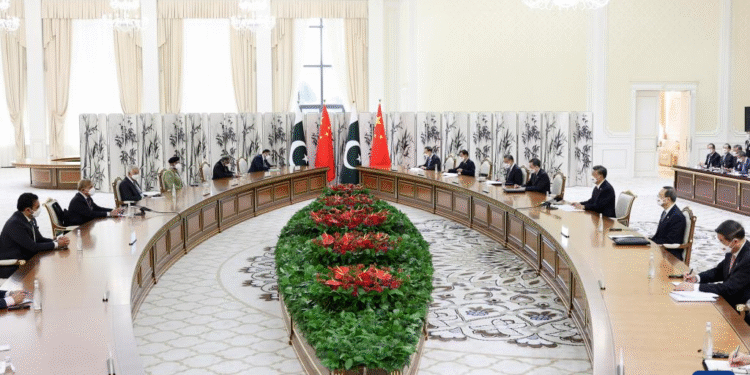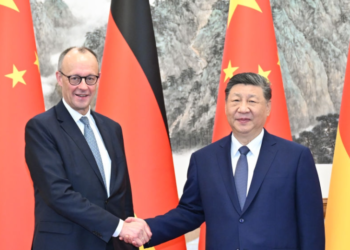BEIJING: In BEIJING, the 11th Joint Cooperative Committee (JJC) of the CPEC evaluated and integrated the project’s most recent advancements. Shahbaz Sharif, the prime minister of Pakistan, stated that we are now on the path to infuse new aspects into our CPEC collaboration at the China-Pakistan Business Forum, which was hosted by the Pakistani Embassy in Beijing on Wednesday (November 2).
The forum is a component of his trip to China, where he began on Tuesday night (November 1) with his arrival in Beijing for a two-day official visit.
The prime minister told a group of more than 400 Chinese businessmen who were watching the conference online that he had “very fruitful” meetings with the Chinese side this morning and added that we will concentrate on the Peshawar to Karachi ML1 project and the Karachi Circular Railway for the China-Pakistan Under Economic Corridor (CPEC).
As part of the CPEC, Shahbaz Sharif has asked Chinese businesses to invest in solar and other renewable energy, agriculture, IT, and AI. The process for solar projects would be different from other CPEC coal-fired power projects, according to the prime minister, as they wouldn’t require going to a third party for collateral, a sovereign guarantee within 60 days, G-to-G (Government to Government) companies, or G-to-G investments and payments.
In a recent interview with Chinese media, Shahbaz Sharif stressed that the China Pakistan Economic Corridor (CPEC) and the Belt and Road Initiative (BRI) have improved Pakistan’s infrastructure and energy infrastructure and are beneficial to the global community. BRI and CPEC are anticipated to have a significant impact on the area, he continued.
Shahbaz announced on Twitter before departing for his official visit that he would concentrate on CPEC revitalization and that “the second phase of CPEC promises to usher in a new age of socio-economic growth” that would increase the standard of living for our people.
In a recent interview with Chinese media, Shahbaz Sharif stressed that the China Pakistan Economic Corridor (CPEC) and the Belt and Road Initiative (BRI) have improved Pakistan’s infrastructure and energy infrastructure and are beneficial to the global community. “BRI and CPEC are anticipated to have a significant impact on the area,” he continued.
Shahbaz announced on Twitter before departing for his official visit that he would concentrate on CPEC revitalization and that “the second phase of CPEC promises to usher in a new age of socio-economic growth” that would increase the standard of living for our people.”
Zhao Lijian, a spokeswoman for the Chinese Foreign Ministry, responded in the affirmative when asked about the visit of the Prime Minister at the daily briefing on November 1.
Additionally, it is anticipated to showcase improved B2B cooperation. The prime minister mentioned that he would have “useful talks” with the Chinese leadership during his visit in a speech he gave on October 31 at the first steering committee meeting of the Pakistan China Business and Investment Forum (PCBIF). The government will establish a supportive atmosphere for cross-border B2B interactions.
In order to do this, PCBIF has created a website for Chinese and Pakistani businesses and investors.
Foreign Minister Bilawal Bhutto Zardari, Finance Minister Ishaq Dar, Railway Minister Khawaja Saad Rafique, Information Minister Maryam Aurangzeb, Sindh Chief Minister Murad Ali Shah, and other officials were part of a high-level delegation led by the Prime Minister.


















